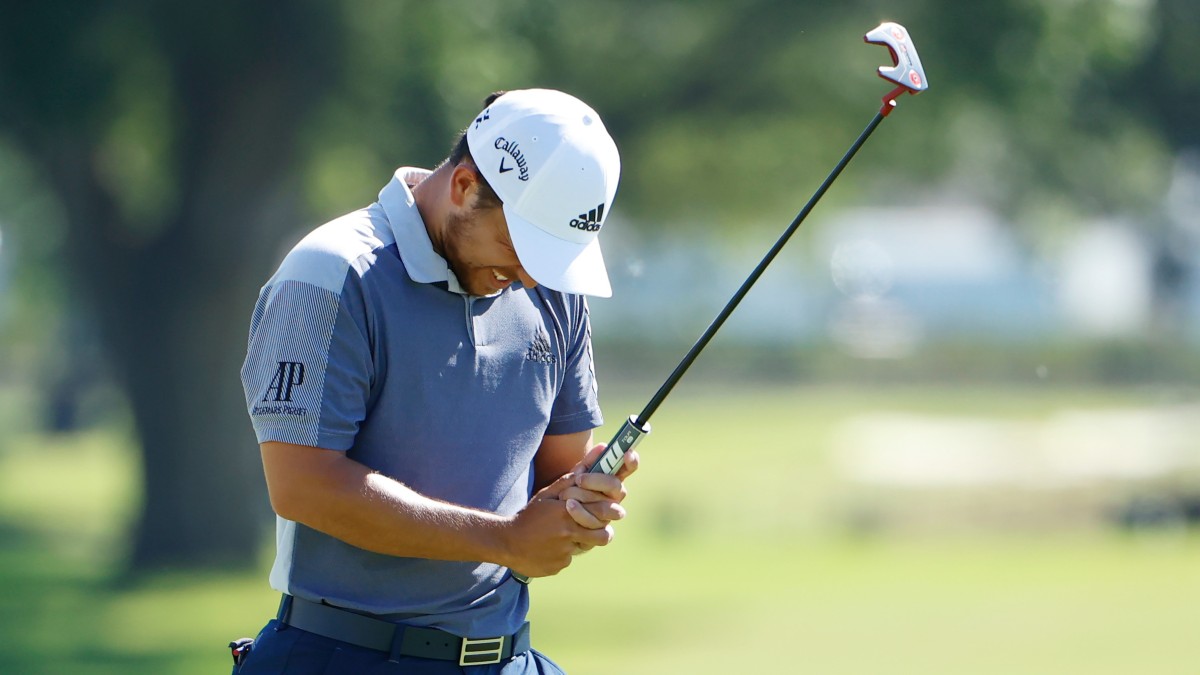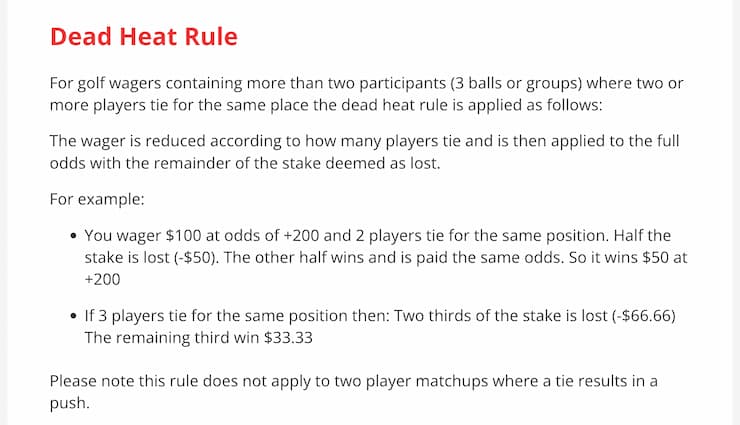Dead heat rules golf betting

Dead Heat Rule applied to Golf Bets In Golf tournaments there is generally not a dead heat for the actual winner of a tournament, as extra holes are played. What are the Golf Dead Heat Rules? You never see a tie for the top spot in any golf betting event, they go to extra holes to crown the. A dead heat is when two or more participants finish in a tie and dead heat rules golf betting be separated. This includes a photo finish in horse racing, a tied. A dead heat in wagering is when two or more participants tie for a position in an event. The calculation is as follows: Your original stake is divided by the.
What Is Dead Heat Betting? How Does It Work and How Payouts Are Calculated
Some sportsbooks, however, allow you to bet each way, which can be a useful tactic at the track or bookmakers. An each-way bet is simply two bets in one—the first part is for the horse to win, and the second is for it to place. If your horse finishes in a dead heat for a place but fails to win the race — there is no need to adjust your stake because the horse finished within the original positions.
A dead heat only comes into play if three horses finish in a tie for third if there are four places on offer, for example. This would then mean that there are three horses tied for only two places. This is two-thirds of your original wager or 66 cents to the dollar. This adjustment is applied to the each-way portion of your bet. In conclusion, we hope our Dead Heat Betting Guide has equipped you with the fundamentals required to navigate tie finishes with confidence when betting online.
If you have any additional queries, hopefully, the FAQ section below will address them. A dead heat reduction is the technical name given to the process by which a bookmaker halves your stake in the event of a tied finish. This means that the original payout, as seen on your bet slip when you placed the wager, would also be halved.
That said, it always pays to double-check with your sportsbook that there are no variations. Thanks in no small part to advancements in technology—better cameras, zoom, panoramic technology, etc. But, to be fair, dead heats have always been uncommon. In fact, according to Wikipedia, there have only been 76 recorded dead heat finishes in horse racing since !
This works out to approximately one dead heat every three years on average. What Is Dead Heat Betting. Ross Bennellick. Updated: April 30 MGM doesn't have dead-heat rules at all for bets like Top 20s, and will pay ties in full. Dead heat rules golf betting PointsBet cuts the odds. Most others cut the stake.
Even if you're betting longshots, where the stake is small and the payout is large, you'd want to have the odds cut. Let's say Jason Kokrak is to finish Top 5, and he ties for fifth with two other players. Of course, you'd rather have no dead heat applied at all. So bet at MGM if you can.
No dead heat is a tremendous advantage for bettors, assuming the prices are comparable to other books. It's really difficult to put exact math on it, but if the prices are far worse at a non-dead heat book, it's not worth the hopes of getting paid in full.
Some of MGM's odds for finishing position are worse than the market, but others aren't. Typically, dead heat books will offer slightly better odds overall, but that doesn't mean they'll have the best odds on every golfer. This site contains commercial content. We may be compensated for the links provided on this page. The content on this page is for informational purposes only.
Action Network makes no representation or warranty as to the accuracy of the information given or the outcome of any game or event.  US Betting. Get App. Gambling Problem. Call New Users Only. Terms and Conditions Apply. Two-ball matchups feature two players going head-to-head. You're just trying to pick which golfer will score better.
US Betting. Get App. Gambling Problem. Call New Users Only. Terms and Conditions Apply. Two-ball matchups feature two players going head-to-head. You're just trying to pick which golfer will score better.
Round matchups, often called hole matchups, work the same way, with the odds adjusted to account for the fact that it's easier for a lesser player to beat a better player over 18 holes instead of Sportsbooks will offer Round 1 matchups in the days leading up to the event, and new pairings between each round over the weekend. On Saturday and Sunday, the matchups offered will usually be between players paired together.
You'll win your full-tournament matchup bet if your golfer makes the cut and the other one doesn't — even if your golfer implodes on the weekend and ends up with a worse score to par at the end of the tournament. If both players miss the cut, the winner will be whoever had the better score after those two rounds.
If a player withdraws during the tournament , you'll lose the matchups if you bet on them. Depending on the sportsbook, you may see slightly different 2-player matchups listed that can actually make a big impact. Generally, you want to bet the option where a tie results in refunded bets and not the one where the tie is its own bet.
That's because the three-way option has more vig , which is advantageous for the sportsbook. BetMGM lists two players with a tie bet available and two players with a tie resulting in a refund right next to each other. Here's another Masters example. For the two-way market where the tie is refunded, the sportsbook margin is 4. If you don't think the tie will come into play and want to bet your golfer at a slightly better price, go ahead.
Just know that in the long run, it's disadvantageous because the sportsbook margin is higher. Three-ball matchups feature three players, with each usually at plus-money. That's because it's harder to beat two other players than one, so the probabilities are spread out across the three players.
Popular Pages
- American masters golf betting odds
- Brooks koepka odds to win masters
- Points bet dancing golfer
- Daly miniature golf 100 doallr bet
- Stats to use betting golf
- Pga tour prediction
- Pga pnc leaderboard
- Saudi international golf betting tips
- The memorial odds
- Dpwt leaderboard
- Golf betting pa
- Odds for waste management open
- Pga odds for this weekend
- How to bet on golf and win
- Best golf betting podcasts